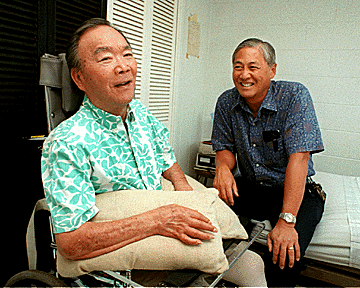
Harry Mamizuka, left, and Jeff Yamashita talk about the old days at Palama Settlement as it approaches its 100th anniversary.
Photo by Dennis Oda, Star-Bulletin

Harry Mamizuka, left, and Jeff Yamashita talk about the old days at Palama Settlement as it approaches its 100th anniversary.
Photo by Dennis Oda, Star-Bulletin
By Pat GeeHarry Mamizuka's goal has always been 'for the kids to get something in life
His heart must have been in his throat more often than not, considering how many swimmers Mamizuka has coached to victory at Palama Settlement. Yet he has wielded an iron hand over youngsters who have become "like my own children," says a man known to everyone as "Mami." He's hard on the outside - often using language that would make a sailor blush - but soft on the inside, he admitted.
Mamizuka's dedication to coaching was not to be denied even when a 1989 auto collision left him paralyzed from the neck down. He now acts as an advisor several hours a week at the Manoa Aquatics Swim Club.
His road back to the swimming pool was paved by Diane Mitsuda Taylor, a student of his for eight years and now a pool manager at Moanalua Gardens. With the same compassion that compelled Mamizuka to mold the lives of his kids through swimming, Taylor put him in the pool and exercised his atrophying muscles in defiance of a doctor's diagnosis that nothing could be done for him.
Before she started massaging and moving his limbs, Mamizuka could barely wiggle his big toe. Now he can move his arms and legs.
Mamizuka's biggest goal has always been "for the kids to get something (in life). I feel good when kids can go away to college to learn what life is about."
According to former swimming champion Jeff Yamashita, now a pastor and city investigator, "He took us by the neck and told us to behave. He made sure we stayed in school."
"And respect your mom and dad - that's number one!" Mamizuka interjected.
"He touched a lot of lives," Yamashita said. "He built character in us ’xxx He helped us live and survive."
From the 1920s to the '50s Mamizuka would go around with four wheelbarrows to scrounge canned goods from merchants on Vineyard Blvd., King and School streets, with "all the little kids following me." There was "no more food at home," he said.
Sometimes, when they were lucky, a dollar would buy 10 pounds of day-old doughnuts from the bakery on Saturdays.
Mamizuka, 74, started helping swimming instructor Nelson Kawakami at the age of 17 to "keep the poor kids out of trouble," and he often had to chase them out of the water at the end of the day with a "go home!" He kept them in line with a bark or bawling out, and occasionally a swat with a broomstick, but the kids knew his brusque ways were a sign that "he cared for us," added Yamashita.
"It makes you feel proud," Mamizuka said, when one of "the rottenest guys I've ever known became a schoolteacher ... I had a lot of good athletes, and they're all suc
cessful in their lives."
Many youngsters eventually won scholarships to college because of the swimming skills honed by Mamizuka, whose teaching methods are not found in books.
Observing that "no two persons are alike," Mamizuka tailored the basic swim strokes to the different body types of his students to maximize the efficiency of every movement.
The swimming program was especially tough in the 1950s, he said. "Palama was something," he recalled, shaking his head in wonder. "No one can beat Palama." Even though he stopped working there in 1974 and went to coach elsewhere, "my heart will always be with Palama Settlement."
With five children of his own to raise, Mamizuka still found the time to meet the needs of so many kids. He would work all day as a "pick-and-shovel man" installing traffic lights, coach swimming or football at McKinley High School after work, go to Palama to coach either sport, then work as an baseball umpire at night.
Why?
"So that my family could survive," he said simply.
Somehow he managed to walk the floor with them at night when they were sick and wash their diapers in the nearby river, he said.
Now that he needs them to take care of him, his children as well as his other kids are coming through in championship form.
The Related Story:
Palama Settlement is 100 years old
Harry Mamizuka makes a difference